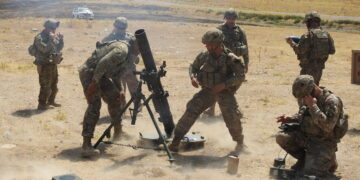October 25, 2023
U.S. troops in Iraq and Syria remain at risk
FOR IMMEDIATE RELEASE:
October 25, 2023
Contact: press@defensepriorities.org
WASHINGTON, DC—U.S. troops in Iraq and Syria have come under fire from rocket and drone attacks in recent days. Defense Priorities Policy Director Benjamin H. Friedman issued the following statement in response:
“As the United States scrambles to better protect its forces in the Middle East for fear they could be targeted when Israel launches its ground offensive in Gaza, as seems imminent, a major question is left unanswered: why are U.S. forces there in the first place? Why should American service-members, especially the relatively small and vulnerable contingents in Syria and Iraq remain in harm’s way?
“The Biden administration tells Americans our troops are in Syria and Iraq to fight ISIS. But ISIS ceased to be a coherent organization when its self-proclaimed territorial caliphate was destroyed more than four years ago. A variety of local actors are hunting its scattered remnants, who pose little threat to Americans. If the United States still needs to join the hunt, it can do so from bases further afield, outside the line of fire.
“A regional conflagration resulting from the war in Israel is a possibility U.S. foreign policy should labor to avoid. That starts with limiting paths to escalation. Rather than doubling down on threats and sending more troops, the United States should be sure that its forces are secure, not bait for actors willing to risk a wider war. The major risk is the small contingent of U.S. forces in Iraq and Syria. The offshore naval presence is more flexible and secure, and thus far less problematic.
“Like Hezbollah and even Hamas, the Shi’ite militias in Iraq and Syria are often described as Iranian proxies. The reality is these groups have less of a command relationship with Iran than a financial one. One cannot assume attacks by these actors come at Iran’s behest or that their desire for escalation mirrors Tehran’s.
“These regional dynamics—the war in Israel, dangerous instability in Syria and Iraq, Iran’s rivalry with Gulf States—are reasons to get out of the region, not to try to manage it better. Trying to run the Middle East and taking fire as a result is a job we should have quit long ago.”
More on Middle East

Featuring Daniel DePetris
October 8, 2025
Events on Middle East








